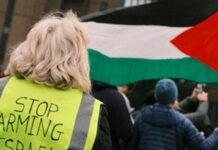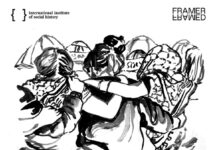Oren Ziv
+972 Magazine / June 19, 2022
New figures show surge in killings of West Bank Palestinians and no drop in demolitions during the first 12 months of the ‘government of change’.
Israelis killed more than 90 Palestinians in the occupied West Bank during the first year of the Bennett-Lapid administration, according to data gathered by Israeli human rights NGO B’Tselem and published here for the first time. The figure represents a 60 percent increase in Palestinian deaths at the hands of Israelis compared with the final year of the Netanyahu government.
In total, the Israeli army and police have killed 88 West Bank Palestinians since the inauguration of the Bennett-Lapid government, with Israeli civilians killing a further three. In the case of yet another killing, it has not been established whether they were killed by a civilian or a policeman.
These numbers do not include the deaths of Shireen Abu Akleh (shot dead last month in Jenin) and Walid al-Sharif (who died in hospital following a protest at Al-Aqsa), where in both cases the offender has not yet been officially established. In the case of Abu Akleh, eyewitness testimonies have been corroborated by substantial evidence pointing to the Israeli army’s responsibility, which Israel continues to deny.
In contrast to the 92 Palestinians killed by Israelis in the past 12 months, between June 13, 2020, and June 13, 2021 — Netanyahu’s last year in power — 57 Palestinians were killed in the West Bank and East Jerusalem. Fifty-two of those were killed by the army and police, two by settlers, and three others by an undetermined perpetrator.
In the besieged Gaza Strip, on the other hand, there has been a sharp decline in the number of deaths, from 232 during the final year of the Netanyahu government to four during the first year of the Bennett-Lapid government. This gap stems, of course, from the fact that the end of Netanyahu’s tenure saw Israel’s 11-day bombardment of the strip, as part of what it called “Operation Guardian of the Walls.” One of the deaths from the past year was the result of injuries sustained during that assault.
The data also shows a 72 percent jump in Israeli casualties on both sides of the Green Line: 23 Israelis have been killed in the first year of the Bennett-Lapid government, compared to 13 during Netanyahu’s final year. Fifteen of the 23 killed were civilians, who were all the victims of a spate of deadly attacks by Palestinians inside the Green Line from late March to early May 2022.
Five of those killed were members of the army and police, and two were foreign workers. Another civilian, Ken Ben Mocha, was shot dead by the brigade commander of the Israeli army for the Binyamin area of the West Bank at a busy junction in southern Israel, after it was alleged that he snatched a weapon from a soldier. The data does not include three Palestinian citizens of Israel who carried out attacks and were subsequently shot dead.
Figures that Haaretz journalist Hagar Shezaf obtained from the security establishment and published last week show that there has also been an increase in settler violence in the West Bank during the past year. The data shows that there were 650 incidents of nationalist violence against Palestinians in 2021, compared to 500 in 2020. In the first five months of 2022, more than 400 such incidents have already been reported.
‘It’s not a bug, it’s the system’
With regard to the demolition of Palestinian-owned buildings in the West Bank, it appears that the Bennett-Lapid government has maintained a similar rate to its predecessor: around 57 demolitions per month, on average.
In Netanyahu’s last year in office, Israeli authorities demolished a total of 687 buildings in the West Bank; 487 of these were non-residential, while 200 were residential, leaving a total of 685 people homeless including 357 minors. For the Bennett-Lapid government, data is only available up to the end of April. Since its formation, the new government has demolished 533 buildings in the West Bank; 405 of them were non-residential buildings, meaning 128 homes were destroyed, leaving 382 people homeless including 195 minors.
In East Jerusalem, Israel destroyed an average of 14 houses per month in the last year of the Netanyahu government, compared to an average of 17 per month in the first year of the Bennett-Lapid government. Although more people have lost their homes, the data shows that there has been a slight decline in the rate of demolition of residential buildings under the new government.
According to the data, in the last year of Netanyahu’s tenure, Israel destroyed 107 residential buildings and 56 non-residential buildings in East Jerusalem, leaving 298 people, including 153 minors, homeless. Under the new government, 95 residential buildings and 63 non-residential buildings have been demolished (up to the end of April), causing 345 people to lose their homes, including 164 minors.
Abeer Baker, a human rights lawyer who represents Palestinian prisoners, said in response to the figures: “There was some hope that the fascism would decline, but for Palestinians there is no period of quiet. From the perspective of daily life and killings, the policy of occupation remains the same. The new government has the same agenda, they are just more subtle in terms of incitement, legislating fascist laws without making noise.”
Issa Amro, a Palestinian activist from Hebron/Al-Khalil, told +972: “Since the formation of the Bennett government, we have seen an escalation in the West Bank: more settler violence, more army raids, the army opening fire indiscriminately, soldiers feeling that the prime minister has their back, that they have a green light to do whatever they want with impunity.
“The right is both in government and in the opposition,” Amro continued, “and I do not hear voices from inside the government — from Meretz, or Yair Lapid — trying to take their government in the direction of their own ideology. Their goal is only to survive, at the expense of the human rights and lives of the Palestinians.
“Even the killing of Shireen Abu Akleh was not a big story for them, which calls into question their participation in the government. If this had happened during Netanyahu’s tenure, the reaction in the public and the political system would have been stronger.”
B’Tselem’s Field Research Director Kareem Jubran added: “Violence against Palestinians, and the fact that its perpetrators — from the junior soldier, to the upper echelons, the ministers and Supreme Court judges — all have impunity, is a major component of the apartheid regime. It’s not a bug, this is the system itself. This is true of all Israeli governments, past and present. The only way to end the violence is to end the occupation and apartheid.”
Oren Ziv is a photojournalist and a founding member of the Activestills photography collective












